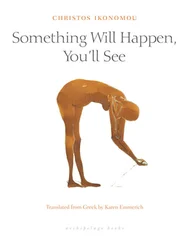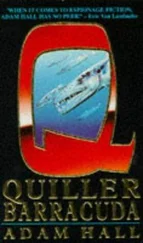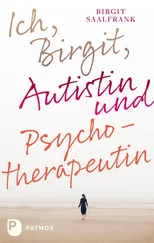It’s my fault, thought Dan. It is my failure that has aged him.
‘I don’t need much, Mum. We’re only going for a few days, aren’t we?’
His father blurted out, ‘I’m really glad you’re going with your mum, Dan. This means so much to her.’ Behind him, at the stove, his mother reached back and squeezed Dan’s shoulder.
When the keftethes were ready, his mother asked Dan to get his brother. Dan walked down the hallway and knocked on Theo’s door. There was no answer, so he knocked again, then opened the door.
The curtains were drawn and Theo was sprawled on the bed. Dan could smell the marijuana, the accumulated fetid stink of sweat and adolescent boy, strong, overpowering, straight down his lungs. Theo’s shirt had ridden up and Dan was shocked at the flush of tight wiry curls on his brother’s flat stomach.
Theo scowled. ‘What do you want?’
‘Lunch is ready.’
‘I’m not hungry.’
There were no swimming posters on his brother’s wall, no more Kieren Perkins or Susie O’Neill. There were no athletes, nothing to do with sport except a Magpies pendant: all of Dan’s old trophies and championship ribbons had gone. Instead there were two enormous band posters, ghoulish exaggerated faces, a man’s face painted white, blood-red lipstick, his mouth opened wide in an expressionist scream. There was a smaller poster of a supermodel in a bikini, there was an A4 black and white leaflet for a rally against the war in Iraq, a poster of a thick-necked, preposterously muscled black rapper wearing a baseball cap with a dollar sign on it, gold chains decorating his oversized glistening chest. Dan didn’t know any of them, what they were, what they sang, what they meant.
Theo had closed his eyes.
Dan tried again. ‘Come on, mate, do it for Mum.’
The boy sat up abruptly. ‘As if you’ve ever given a shit about Mum!’ His reply dripped with disbelief and scorn, the outrage rising to a juvenile screech. He couldn’t steady the trembling in his voice. ‘As if you have ever given a stuff about anyone but yourself. When did you last call Regan? Do you have her address, do you even have her fucking number?’
Dan couldn’t answer.
‘Thought so. And she still defends you, she still thinks you care about us.’ Theo lay back on the bed and turned to the wall. His next words were muffled. ‘Just get the fuck out of my room.’
Dan heard him clearly. He stood there, clenching and unclenching his fist. I could fucking kill you, I could take you by the fucking neck and wring it till you choked. He told himself to breathe, to remember the lessons he’d learned in prison: to count down from ten, slowly, not to rush through the numbers, to mouth them, to visualise them, to breathe in and out between the numbers as he counted. It was a simple trick and he always felt a little foolish doing it, but it worked. By seven his hands had relaxed and by three there was no anger.
‘OK, mate, I’ll get Mum to save you some for later.’
He shut the door, but not before he heard the mumbled words: ‘Fucking loser.’
The keftethes tasted good, the keftethes tasted as he remembered them. But he didn’t know if they were still his favourites, he had yet to rediscover that.

After lunch they hit the road. His mother had delayed their departure searching for CDs to take along for the drive. She had finally got rid of her old Datsun — by the end the chassis was more rust than steel, Dan remembered — and had bought herself a five-year-old Hyundai.
‘It doesn’t have much grunt,’ his father explained, grinning, leaning against the lounge doorframe with his arms folded, watching his wife search frantically through cases of CDs, ‘but it has a shit-hot stereo and that’s all your mother cares about.’
She had chosen good music for their long drive across the border. There were the strong-lunged, honey-voiced singers that she adored, Etta James and Mavis Staples. There were the growlers, Cash and Jennings, Joplin and Cave. And then there were those she called the angels, the ones who healed as they sang: Aretha Franklin, Nina Simone, Presley. She sang along to all of them. Dan’s father was the singer in the family; Neal’s voice was strong, it had character and he could hold and tame a note. Dan’s mother’s voice was reedy, and both high and low registers defeated her. She could butcher a melody, could go badly off-key. But Dan didn’t mind. As the city ended and they sliced through the low plains of farm and scrub, he took pleasure in her joy at the music, in being on the open road, in the fact that the space between them was being filled with music rather than conversation. He was safe in the music, he felt at home in it.
After they’d reached the end of a George Jones CD his mother said, ‘I’ve packed some Soundgarden, I’ve got Nevermind .’
He knew she’d brought them along for him, but his heart was sinking as she pushed in the Nirvana CD. The chords thrashed and boomed through the car, lashing at his ears. He ejected it immediately. His mother said nothing as he chose another disc from the pile, an Everly Brothers compilation. She sang along to ‘Unchained Melody’, her voice cracked on the final chorus of ‘You’ve Lost that Loving Feeling’ but stayed true on ‘Cathy’s Clown’. All the words came back to him. He could take comfort in the familiarity of all these words and notes and melodies.
In Ararat they stopped for a break. All the shops were open for the Easter Saturday trade. They went past a second-hand bookshop. ‘Do you mind if we go in?’ his mother asked and he agreed gladly. They spent twenty minutes looking through rows of dusty books. Dan picked up worn copies of Faulkner’s The Sound and the Fury and David Malouf’s Remembering Babylon .
His mother chuckled as she stood beside him at the counter, and paid for the books. ‘That looks like pretty heavy reading there, mate,’ she said as they headed back to the car. She threw him a quizzical look. ‘I don’t remember you reading much at all when you were at school.’
Dan hesitated. He wanted to say that he’d learned to read in gaol, to really read. He wanted to tell her that the library had been his favourite place inside, that when he read As I Lay Dying he’d found a voice that made sense of time and space as he was experiencing it in gaol, that it had spoken to him more clearly and more profoundly than any voice he’d ever encountered before: of how the past could not be separated from memory, of how it was not only time that changed people, it was memory as well. He wished he could tell her how he’d read Johnno in one sitting at the library table and that he’d started it again before lights out that night. He wished he could tell her about discovering words and how words could become song, something he had never understood at school. Not that he had ever scoffed at books; his parents would never have tolerated that — even his father’s suspicion of the learned had never extended to learning itself, he loved stories too much. But the young Danny had never worked out how to make time for books; he had believed that the dedication required would pull him away from routine and from his body, from his goal of success. In prison, however, where everything was ordered by time, but time itself was always elusive, out of reach, he realised that he had been wrong about books.
Sitting at a desk in the library, reading in his cell, losing himself in a dog-eared copy of 1984 , his whole being had been immersed in the ferocious lust for escape that drove Winston Smith. The novel had so shaken him that he’d had to gasp for air, as if he had swum an ocean. Desire and betrayal: George Orwell had chronicled Dan’s soul. Soon after, he had picked up a slim volume from a donated crate of books, a collection of Chekhov’s short stories, the spine broken, some of the pages falling loose. Dan had never read a short story before in his life. One particular story he had returned to again and again, reading it obsessively: ‘A Day in the Country’, the story of an innocent Russian peasant world that could not possibly be part of the same universe that had created the brutal shaming world of prison. Dan couldn’t understand how he had become the peasant boy Danilka, how he knew how the boy moved and breathed, how he could feel the soreness of Danilka’s wrist when the old cobbler had freed it from the hole in the tree, how as he read of the journey through the fields and back to the village he could smell the scent of bird cherry, meadowsweet, and lilies-of-the-valley after the storm. He had reread it immediately, and realised that he had been wrong; that as the old man had crept into the deserted barn to make the sign of the cross over the sleeping orphans, Chekhov had indeed captured some of the brutality as well as the tenderness of the world. Dan had furtively torn the pages of the story out of the book — no one would know that they had ever been there, the book was old and that torn, no one would ever know — and he had guarded that story through his last few months in prison, kept it folded inside a tear in his mattress. That story had returned him to childhood, had made him shudder with a joy so intense it seemed almost erotic. Had he ever known such joy?
Читать дальше









